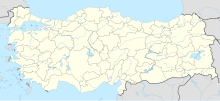Euphrat College
Koordinaten: 38° 42′ N, 39° 15′ O

Das Euphratkolleg (armenisch Եփրատ Գոլէճ, türkisch Fırat Koleji) oder Armenienkolleg (englisch Armenia College) war eine koedukative Einrichtung für höhere Bildung in Harput im Osmanischen Reich. Die Schule wurde 1852 von US-amerikanischen Missionaren gegründet und hauptsächlich für die armenische Gemeinde in der Region betrieben.
Geschichte
1852 errichtete das American Board of Commissioners for Foreign Missions (ABCFM) ein theologisches Seminar in Harput, um Geistliche für die Armenisch-Evangelische Kirche auszubilden; 1859 wurde es zum "American Harput Missionary College" ausgeweitet. Um der Nachfrage nach einer Ausbildung in englischer Sprache nachzukommen, wurde das Schulangebot 1878 ausgeweitet, und das Kollegium in Armenia College umbenannt. Nach nur zehn Jahren drängten die osmanischen Behörden darauf, den Schulnamen zu ändern, sodass es von nun an Euphratkolleg hieß. Für den Bau des Colleges wurden von der Regierung der Vereinigten Staaten 140.000 US-Dollar bereitgestellt, zusätzlich spendeten 1875 die örtlichen Anwohner des Vilâyet Mamuretül-Aziz 40.000 $. Zum College gehörten ein Krankenhaus und ein Waisenhaus neben einem theologischen Seminar sowie einem Gymnasium für Jungen und Mädchen.
Bei den Massakern an den Armeniern 1894–1896 brandschatzten und plünderten muslimisch-kurdische Nachbarn die armenischen Dörfer auf der Harputebene. Von diesen Übergriffen war noch im gleichen Monat auch die Stadt Harput betroffen, sodass acht der zwölf Gebäude auf dem Campus des Euphratkollegs niedergebrannt wurden.
Beim Völkermord an den Armeniern 1915 wurden mehrere der leitenden Fakultätsmitglieder festgenommen, gefoltert und hingerichtet. Die Räumlichkeiten des Kollegs wurden vom osmanischen Militär besetzt und zunächst als Trainingscamp, danach als Militärkrankenhaus genutzt.[1]
Nach der Gründung der Republik Türkei unter Mustafa Kemal Atatürk wurde das Euphratkolleg endgültig geschlossen; von seinen Gebäuden ist nichts mehr erhalten.
Präsidenten
- Dr. Crosby Wheeler (1878–1893)
- Dr. James Levi Barton (1893–1894)
- Dr. Caleb Frank Gates (1894–1903)
- Rev. Henry H. Riggs (1903–1910)
Fakultät
- Ellsworth Huntington (1897–1901)
- Ashour Yousef
- Donabed Lulejian
- Schahan Natali
Quellen
Einzelnachweise
- ↑ Henry H. Riggs, "Days of Tragedy in Armenia: Personal Experiences in Harpoot, 1915-1917", 1997, Michigan.
Auf dieser Seite verwendete Medien
(c) Karte: NordNordWest, Lizenz: Creative Commons by-sa-3.0 de
Positionskarte der Türkei
Autor/Urheber: Internet Archive Book Images, Lizenz: No restrictions
Identifier: christianmissi01denn (find matches)
Title: Christian missions and social progress; a sociological study of foreign missions
Year: 1897 (1890s)
Authors: Dennis, James S. (James Shepard), 1842-1914
Subjects: Missions Christian sociology
Publisher: New York, F. H. Revell
Contributing Library: Princeton Theological Seminary Library
Digitizing Sponsor: Princeton Theological Seminary Library
View Book Page: Book Viewer
About This Book: Catalog Entry
View All Images: All Images From Book
Click here to view book online to see this illustration in context in a browseable online version of this book.
Text Appearing Before Image:
we find that men who wouldnot dream of doing their neighbours injustice or injury in the ordinaryaffairs of life have no hesitation in overreaching them in a commercialbargain. Trade is thus placed by immemorial custom outside the sphereof morality,—it is something to which ethics do not apply any morethan they apply to the differential calculus,—and the result is whatmight be expected. In India deceit is regarded by the mass of the people as the guar-antee of business success. There is a story of a magistrate who planteda bazaar with pipal-trees, but was waited upon byDearth of commercial a deputation of the shopkeepers, who begged him integrity in India, . ,, „ .. Persia, and Turkey. to remove the trees, for they could not tell liesunder them, and business would come to a stand-still. This request was based upon the common belief that gods re-side hidden among the leaves of the pipal-tree, and inflict punishment , , r >• See The Nineteenth Century, November, 1896, p. 727.
Text Appearing After Image:
Euphrates College, Preparatory Department for Girls. Primary School, No. i, Harpoot. Euphrates College, Preparatory Department for Girls. Primary School, No. 2, Harpoot. American Educational Work in Turkey (A.B.C.F.MO THE SOCIAL EVILS OF THE NON-CHRISTIAN WORLD 287 upon any one whom they hear telling lies. A common oath is made,while crushing the leaves of the tree in the hand, by invoking the godsto crush the maker of the oath as he crushes the leaf in his hand if heis not telling the truth.1 It was formerly the custom for the Govern-ment to superintend the management of Hindu temples, but this dutywas afterwards handed over to the Hindus themselves. Many com-plaints have resulted as to the maladministration of temple revenues,and the British Government has been invited to interfere again.-These remarks do not apply to all sections of the Hindu population, asthe influence of the British element, and the contact of the larger mer-chants with European commerce, have brought new standar
Note About Images


